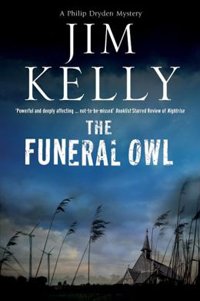The Cambridgeshire Fens. High Summer. Fen Blows – dust storms that whip the topsoil off the flat fields and pepper the isolated Fen bungalows and cottages like birdshot. The drains – man-made rivers that hug the ruler-straight country roads, and whose black depths have claimed many a careless motorist, are ever present. This is no rural idyll. These are the Black Fens, and Kelly imbues the landscape with a malevolence that leaves a sulphurous taste in the mouth. Between the residents of The Fens, trust is a scarce commodity. Isolated settlements, a sense of being cast adrift from the national agenda, a landscape prone to violent climate changes, and a consciousness that nothing existed before the 19th century – nether buildings, roads nor culture, – adds to the collective sense of suspicion and insularity. This is not a part of the world that you mess with. Beyond the soaring towers and turrets of Ely cathedral and the coachloads of international tourists, there is a mean and hard-scrabble world, beset by poverty, thwarted ambition, and limited aspirations.
Philip Dryden is the editor of The Crow, Ely’s local paper. A decade earlier, he had driven his Corsa into the murky expanse of a roadside drain. He and his wife Laura were pulled out. He recovered quickly, but Laura lay in a coma for years. She is now back to full fitness, barring a slight speech impediment, and they are rebuilding their lives with their baby son, Eden. For years he has refused to sit behind the wheel of a car, and has been driven around in an ancient Ford Capri by an overweight and sedentary taxi-driver called Humph. In earlier adventures of Philip Dryden, Humph exists as a kind of Greek Chorus – impassive, contemplative, commentating on the action but rarely part of it. But now, his teenage daughter has run away from his estranged wife, and sought refuge with Humph’s mother in her lonely bungalow near the small town of Brimstone Hill.
While helping Humph deal with his family problems, Dryden makes a professional visit to Brimstone Hill parish church to talk to the odious female vicar about a lead theft from the church roof. In the course of his enquiries he discovers a bizarre and savage murder. The carved wooden figure of Christ has been hacked away from a memorial crucifix in the churchyard, and replaced with an equally inert – but human – corpse. With the reported appearance of The Funeral Owl, a mythical local omen, Dryden is drawn into a complex investigation involving an illicit still, a decade-old murder, two dead tramps and a cobweb of criminality from the past and the present.
Where Jim Kelly is unique in British crime fiction, is that he portrays the Fen topography as the headline villain. Countless writers set their murder mysteries in a benign, soft, golden limestone landscape against which the human actors are the miscreants. But not Kelly. The grim, unforgiving, insular, inbred vastness of The Fens – all sky, church towers and, nowadays, wind turbines – dwarfs the fatal indiscretions of the criminals. Kelly is an admirer of Dorothy L Sayers’ The Nine Tailors. There, she more than hinted at the inherent darkness and destructive power of a waterland kept safe and sane by just a few man-made sluices and fragile engineering works. I suggest that Kelly has matched the good lady here. I must declare an interest, as a resident of Fenland. It is the scariest place I have ever lived in, and Jim Kelly captures its latent menace with a book which deserves to become a classic.
Creme de la Crime
£14.99
Print
CFL Rating: 5 Stars










